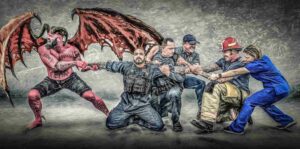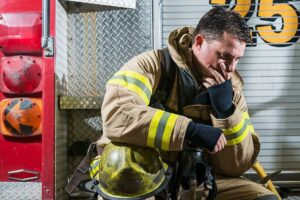Did you know that first responders are at a higher risk for developing PTSD? This is because of the nature of their job, which often puts them in dangerous and traumatic situations. In this blog post, we will discuss some things that you should know about first responder PTSD. We will also provide some tips for how to deal with this condition if you or someone you know is affected by it.
Contents
What Does First Responder PTSD Mean?
 This term refers to the specific type of post-traumatic stress disorder experienced by individuals who work in emergency response fields, such as firefighters, police officers, and paramedics. PTSD is described as a mental health disorder that can develop in individuals who have experienced or witnessed a traumatic event.
This term refers to the specific type of post-traumatic stress disorder experienced by individuals who work in emergency response fields, such as firefighters, police officers, and paramedics. PTSD is described as a mental health disorder that can develop in individuals who have experienced or witnessed a traumatic event.
This condition is often a mental response to the constant stress and traumatic events that first responders experience on a regular basis. According to studies, first responders are at a higher risk for developing PTSD compared to the general population, with an estimated 20% experiencing symptoms at some point in their careers.
If you are a first responder experiencing symptoms of PTSD, it is important to seek help. This can be done through therapy and/or medication, as well as finding support from colleagues and loved ones. Remember that seeking treatment is not a sign of weakness, but rather a brave step toward taking care of your mental health.
Who Are First Responders?
First responders are the individuals who rush to emergency situations, including:
- Police officers
- Firefighters
- Paramedics
- Emergency medical technicians
- Military personnel
- Law enforcement officers
- Hotline operators
- Disaster relief workers
- Flight attendants
Unfortunately, the high-stress nature of their jobs can lead to higher rates of post-traumatic stress disorder (PTSD). One study found that 33% of first responders met the criteria for a PTSD diagnosis. This is significantly higher than the national average, which hovers around just over six percent.
These professionals work tirelessly to keep their communities safe and often witness traumatic events on a regular basis. It is often difficult for them to seek help because of the stigma surrounding mental health and the fear that seeking treatment may impact their careers.
Why Is First Responder PTSD Such a Concern?
 Many people may not realize the amount of trauma and stress that first responders experience on a daily basis. Whether it’s responding to car accidents, natural disasters, or violent crimes, these individuals are constantly faced with life-threatening situations and traumatic events.
Many people may not realize the amount of trauma and stress that first responders experience on a daily basis. Whether it’s responding to car accidents, natural disasters, or violent crimes, these individuals are constantly faced with life-threatening situations and traumatic events.
This constant exposure can lead to the development of PTSD, which can have serious impacts on both mental and physical health. First responder PTSD should be a concern not only for the individuals experiencing it, but also for their families, colleagues, and communities.
Because of the demanding and high-pressure nature of their jobs, it is imperative for first responders to have access to proper support and resources in order to prevent and address PTSD. With the right support, first responders can continue to effectively serve and protect their communities.
How To Identify It?
There are some key signs and symptoms to look out for if you suspect a first responder may be suffering from PTSD. These can include things like:
Prolonged and intense emotional distress
It is one of the most common symptoms for those suffering from PTSD. This distress can manifest as fear, anxiety, and/or depression. Prolonged emotional distress can be difficult to manage and often interferes with daily life.
Avoidance behavior
This can range from avoiding certain triggers or situations that remind them of the traumatic event, to even avoiding social interactions altogether. For instance, a firefighter may avoid driving by the site of a fire if they experienced trauma. Or an EMT may avoid interacting with patients.
Nightmares or flashbacks
It is not uncommon for those suffering from PTSD to experience nightmares or flashbacks of their traumatic events. These can be triggered by certain stimuli and can cause significant distress and emotional distress.
Difficulty sleeping
With PTSD, this symptom can manifest in the form of nightmares or even insomnia. A first responder may also have trouble falling or staying asleep due to feeling constantly on alert for danger. For instance, if they were a firefighter, they may have flashbacks of being in a burning building.
Hypervigilance
The constant state of being on high alert can lead first responders to feel easily startled and quick to react in potentially dangerous situations. They may also be constantly scanning their surroundings for potential threats, even when in a safe environment.
Increased irritability or anger
 Many people who are first responders with PTSD may struggle with managing their anger or may become easily irritated in certain situations. This can lead to conflicts in personal relationships and at work. This happens because your fight or flight response becomes heightened, making it harder to control emotions.
Many people who are first responders with PTSD may struggle with managing their anger or may become easily irritated in certain situations. This can lead to conflicts in personal relationships and at work. This happens because your fight or flight response becomes heightened, making it harder to control emotions.
It’s important to note that these symptoms may not always manifest immediately after a traumatic event. PTSD can develop over time and may even be triggered by seemingly small things in daily life. Hence, you should not wait for symptoms to become severe before seeking help.
What Are Some Risks For First Responder PTSD?
When it comes to first responder PTSD, there are a few key risk factors that can contribute to the development of this condition. Some of these include:
- Lack of support: Many people in first responder careers do not have access to sufficient emotional support or resources for dealing with the trauma they experience on a daily basis.
- Frequent exposure to trauma: First responders are constantly exposed to traumatic events, which can lead to cumulative effects and an increased likelihood of developing PTSD.
- High-stress work environment: The high-pressure and fast-paced nature of first responder work can also contribute to the development of PTSD symptoms.
- Traumatic events: Certain particularly traumatic events, such as responding to a mass shooting or natural disaster, can also increase the chances of developing PTSD.
It’s important to note that anyone in a first responder career can be at risk for developing PTSD, regardless of their gender, age, or length of time in the field. These risk factors can also interact with one another, making it even more likely for a first responder to struggle with PTSD.
Therefore, if you or someone you know is a first responder, it’s important to be aware of the potential risks and have a plan in place for seeking help if needed. It’s also crucial for agencies and organizations to provide support and resources for their first responders to prevent and address PTSD.
How Can You Manage This?
 This is a question that many first responders struggle with, and unfortunately, there is no one-size-fits-all answer. But here are a few options that you can choose from and consider:
This is a question that many first responders struggle with, and unfortunately, there is no one-size-fits-all answer. But here are a few options that you can choose from and consider:
- Seek professional help: It is important to remember that there is no shame in seeking therapy or counseling. This can be a difficult journey and having someone to talk to and guide you through it can be extremely beneficial. Various types of therapists can actually specialize in treating PTSD, so consider finding one that fits your needs.
- Find a support system: Whether it’s a group therapy session with fellow first responders or confiding in trusted friends and family members, surrounding yourself with people who understand and support you can make all the difference.
- Connect with other first responders: Sometimes just talking to someone who has gone through similar experiences can provide a sense of comfort and understanding. Joining support groups or finding online forums where first responders can connect and share their experiences can be a great outlet.
- Practice self-care: This is important in managing any type of mental illness, and taking care of your physical and mental well-being can make a huge difference. Make sure to exercise regularly, eat healthily, and find activities that help you relax and de-stress.
- Keep a journal: Many people find it helpful to write down their thoughts and feelings, as it can be a cathartic release. It can also help with identifying triggers and patterns in your thoughts and emotions.
Above all, remember that healing takes time and self-compassion is crucial. Don’t be too hard on yourself, and know that you are not alone in this journey. Remember, you are strong and deserve support in managing your PTSD. Take the steps necessary to care for yourself!
(Note: These are just suggestions and should not be used as a substitute for professional help. It is important to always consult with a medical or mental health professional before making any decisions regarding treatment.)
Conclusion
In conclusion, first responder PTSD is a real and serious issue that needs to be addressed. It’s important for first responders and their loved ones to recognize the symptoms and seek help if necessary. It’s also crucial for society as a whole to provide support. And resources for those who sacrifice so much to protect us every day.
Together, we can work towards reducing the stigma surrounding mental health issues and create a safe. And a supportive environment for our first responders.
For more information and guidance, please contact Therapy Mantra. The team of experts here will be more than happy to help you out and get you on the path to a better life. Contact us today to learn more about our services. You can also book an online therapy session or download our free Android or iOS app.


